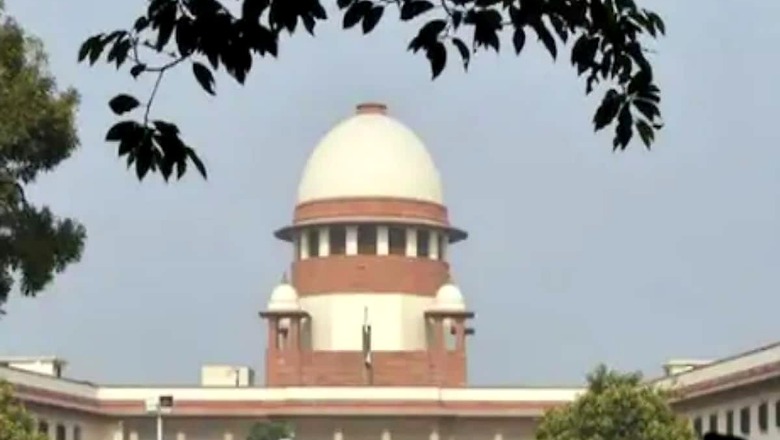
views
The Centre has moved the Supreme Court seeking review of the May 5 majority verdict which held that 102nd Constitution amendment took away the power of state governments to declare Socially and Educationally Backward Classes (SEBC) for grant of quota in jobs and admissions. The Centre has maintained that the amendment did not take away the power of the state governments to identify and declare SEBC and the two provisions which were inserted did not violated the federal structure.
A five-judge Constitution bench headed by Justcie Ashok Bhushan had unanimously set aside Maharashtra law granting quota to Marathas and had refused to refer 1992 Mandal verdict putting a cap of 50 per cent on reservation to a larger bench. The bench in its 3:2 majority verdict had ruled that 102nd Constitution amendment, which also led to setting up of National Commission for Backward Classes (NCBC), gives exclusive power to the Centre to identify and declare SEBC as only President can notify the list.
All the five judges of the bench, however, had held the amendment as valid and said it did not affect the federal polity or violate the basic structure of the Constitution. The 102nd Constitution amendment Act of 2018 inserted Articles 338B, which deals with the structure, duties and powers of the NCBC, and 342A which deals with power of the President to notify a particular caste as SEBC and power of Parliament to change the list. The petition for review of judgement which was filed on Thursday has sought open court hearing in the matter and also stay of the majority verdict on the limited aspect of the amendment, till the plea is decided. The Centre in its plea has said that majority verdict had upheld the validity of Article 342A but in doing so, the bench has interpreted that the provision denudes the states from exercising the power which they undoubtedly have for identifying and declaring SEBC in their respective states.
The majority verdict was rendered by Justices L Nageswara Rao, Hemant Gupta and S Ravindra Bhat, while the minority verdict was of Justice Ashok Bhushan and S Abdul Nazeer, who said that under the constitution amendment both Centre and States have power to declare and identify SEBC. It is submitted that the minority of two judges including presiding judge, has expressly held that Article 342A does not have in any manner deprive States of their power and jurisdiction and competence to identify and declare the socially and educationally backward classes, which is the correct interpretation of Article 342A of the Constitution, the plea has said. The review plea sought direction of the top court for staying the finding and observations made in the majority verdict to the extent that Article 342A and the other provisions inserted by the 102nd Constitution amendment would denude the states of their power to identify and declare SEBC. The Centre further said that the finding and observations made in the majority verdict be stayed so that the powers of the states to identify the SEBC, which always existed is not taken away in the absence of any express provision to that effect in the Constitution. Justice S Ravindra Bhat had written 132-page long verdict and Justices L Nageswara Rao and Hemant Gupta, in their separate judgements, concurred with Justice Bhat and his reasoning in holding that states have lost their power to identify SEBC under their territory after 102nd Constitutional amendment. Writing the majority judgement on this aspect, Justice Bhat had said, Articles 366 (26C) and 342A through the 102nd Constitution, the President alone, to the exclusion of all other authorities, is empowered to identify SEBCs and include them in a list to be published under Article 342A (1), which shall be deemed to include SEBCs in relation to each state and union territory for the purposes of the Constitution. The states can, through their existing mechanisms, or even statutory commissions, can only make suggestions to the President or the Commission, for inclusion, exclusion or modification of castes or communities in the SEBC list, Justice Bhat had opined.
The states' power to make reservations, in favour of particular communities or castes, the quantum of reservations, the nature of benefits and the kind of reservations, and all other matters falling within the ambit of Articles 15 and 16 – except with respect to identification of SEBCs, remains undisturbed, the judgement, endorsed by two other judges had said. Article 342A of the Constitution by denuding States power to legislate or classify in respect of 'any backward class of citizens' does not affect or damage the federal polity and does not violate the basic structure of the Constitution of India, Justice Bhat had said. The five-judge bench have also concurred on the issue that the Maharashtra State Reservation (of seats for admission in educational institutions in the State and for appointments in the public services and posts under the State) for Socially and Educationally Backward Classes (SEBC) Act granting 12 and 13 per cent reservation for Maratha community in addition to 50 per cent social reservation is not covered by exceptional circumstances as contemplated in Mandal judgement.
Read all the Latest News, Breaking News and Coronavirus News here. Follow us on Facebook, Twitter and Telegram.


















Comments
0 comment